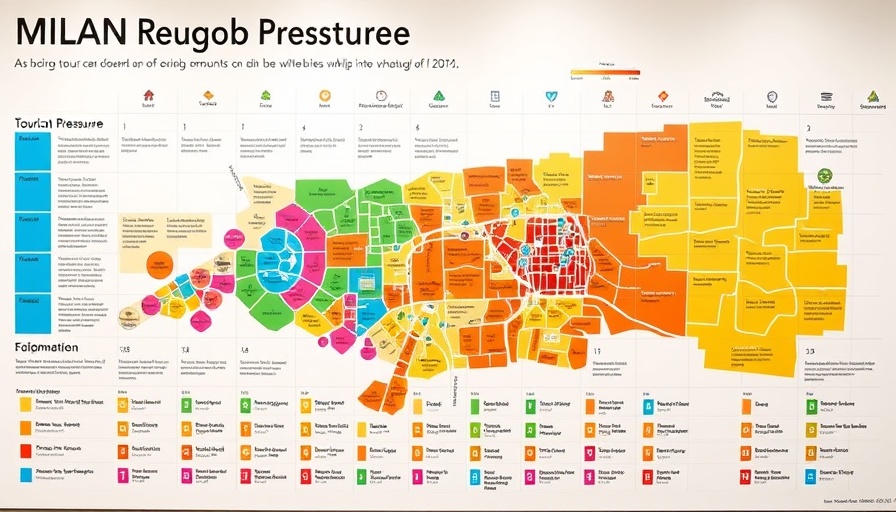
Understanding the Overtourism Debate in Milan
The buzzword 'overtourism' often conjures up images of crowded streets and overwhelmed locals, but a recent study shows a more nuanced picture, at least in Milan. Contrary to popular belief, increased tourist traffic does not uniformly diminish the quality of life for residents. Conducted by The Data Appeal Company in collaboration with Doxa, this groundbreaking research integrates big data analysis with direct feedback from over 500 local residents, ultimately revealing surprising correlations between tourism and urban satisfaction in the city.
The Surprising Findings of the Study
This extensive study, launched in June 2024, illustrates that in many neighborhoods, higher tourism activity coincides with greater satisfaction among residents. In areas like Municipality 6, which includes Barona and Navigli, a vibrant tourism scene enhances community life thanks to accessible green spaces and cultural opportunities. Interestingly, even the historic center, where tourist numbers peak, enjoys high livability rates, supported by quality services. This indicates that it's not the presence of tourists that diminishes life quality, but potentially how cities manage those tourist flows.
Decoding Residents' Perceptions
The research clearly delineates residents' attitudes toward tourism. It reveals that while 75% appreciate essential services and 74% value cultural offerings, there are also concerns. A striking 77% of Milanese link increased tourism to rising living costs, exacerbating feelings of insecurity amongst the populace. This dichotomy of perspectives illustrates a complex relationship, where tourism has the potential to invigorate urban life but also raises crucial questions about equitable distribution of resources and opportunities within the community.
Impact on Quality of Life: More than Just Numbers
One of the most telling insights from the study is that urban livability surpasses mere tourism metrics. For instance, neighborhoods like Città Studi and Porta Venezia, known for their cultural pull, report lower resident satisfaction due to issues like congestion and lack of green spaces. This highlights that a sustainable tourism model should focus not just on attracting visitors, but on fostering environments where both tourists and residents can thrive.
Policy Implications: A Call for Sustainable Tourism Management
Mirko Lalli, CEO of The Data Appeal Company, believes this study offers policymakers a toolkit for dynamically managing tourism flows. The integration of quantitative data with qualitative resident voices is essential for creating actionable strategies. Rather than a one-size-fits-all approach, local governments must consider each neighborhood’s unique characteristics when making tourism-related decisions.
Global Context: Milan's Lessons for Other Cities
The findings in Milan serve as a template for cities worldwide grappling with similar issues. From Barcelona to Venice, urban tourism is under intense scrutiny due to its impacts on local communities. This research challenges the dominant narrative that all tourism is detrimental, suggesting that with enlightened policies and resident engagement, cities can harness tourism as a positive force for urban development.
Embracing the Future: A Balanced Approach to Travel
With rising awareness around sustainable travel, this study reinforces that tourism can coexist successfully with urban life if cities prioritize resident well-being. For families planning trips to Milan or other popular destinations, understanding the local impact of tourism allows for more responsible travel choices. Whether it's participating in community-led tours or opting for lesser-known attractions, travelers have a role to play in maintaining the delicate balance between enjoyment and sustainability.
Join the Conversation: What Can Tourists Do?
As travel enthusiasts, we have a responsibility to engage with our destinations thoughtfully. Consider visiting during off-peak seasons to alleviate pressure on local resources, or supporting local businesses and cultural events that celebrate the community. Travel can be a beautiful bridge connecting cultures; let’s ensure we honor the places we visit while uplifting the local populace.
For a deeper dive into Milan's tourism dynamics, you can download the full study here. Embrace the thoughtful tourist philosophy—where quality experiences enrich lives, both for travelers and residents alike.
 Add Row
Add Row  Add
Add 




Write A Comment